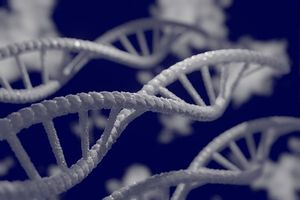Most readers will have heard of the ‘Human Genome Project’. But what exactly is it? In what ways might it benefit humanity? And what should Christians think of it?
First of all, what is a ‘genome’? Think of a company owning millions of factories. Each factory has a central office where it keeps a copy of an instruction manual. The manual contains around 30,000 instructions organised into 46 chapters. These instructions provide all the information needed for everything done and made in each of the factories.
The human body is like that company. It is made up of millions of tiny living factories called ‘cells’. Each cell has an office called the ‘nucleus’ which contains around 30,000 instructions called ‘genes’, organised into 46 clusters called ‘chromosomes’.
Just as meaningful instructions can be written down in words and sentences using the 26 letters in the English alphabet, so genetic instructions are ‘written’ on long string-like molecules of DNA using the 4 different ‘letters’ of the DNA alphabet.
These ‘letters’ are themselves distinctive groups of atoms that, strung together, make up the long DNA molecule. A length of DNA that contains the information needed to make one or more proteins is called a gene, and all the genes taken together form the ‘genome’.

The information contained in genes defines attributes like skin and eye colour, and (along with environmental factors such as diet and exercise) determines physical characteristics such as height, weight and build. Genes play a role in every area of human life and we are now beginning to discover their involvement in more complex human qualities such as behaviour and disease.
The human genome project
The ‘Human Genome Project’ began officially in 1990 as a collaborative international effort to identify the 30,000 or so genes in the human genome and to determine the sequence of the ‘letters’ which make up human DNA.
Other aims were to develop better techniques for studying human genes and also to address the ethical, legal and social issues arising from the project. Originally intended to last 15 years, it will now be completed by 2003, as faster techniques for DNA analysis have become available.
Potential benefits to humanity
A number of important benefits to mankind could arise from knowing what each of the 30,000 genes in the human genome does and where it is to be found in our chromosomes.
Ever since the Fall human beings have been vulnerable to many kinds of disease. Some of these diseases are caused by faulty ‘spelling’ in the genetic code, some by too many ‘chapters’ in the genome, some by the malfunction of an organ, and some by infections.
However, each person’s genome helps to decide his or her susceptibility to a particular disease, even when the disease is not genetic in origin.
Along with our behaviour, therefore, genes play a role in all health issues. The human genome project will help to clarify how genes are related to diseases, which will then be better understood. Diseases will be discovered earlier in life, treated more effectively and ultimately cause less suffering and death than they currently do.

Plants and bacteria
In the same way, parallel studies on the genomes of plants and other organisms will also benefit humanity. Plants are the most efficient energy producers in the world, taking the sun’s energy and converting it into a usable form.
When the genetics underlying this process have been worked out, we may be able to copy this remarkable process that God has created. A better understanding of plant and animal genetics will enable us to farm more efficiently, theoretically saving millions of lives in the poverty-stricken Third World.
Bacteria are waste-disposal experts, and a genetic knowledge of how they break down and extract energy from even toxic substances will help create cleaner and cheaper industry.
Increased understanding of the genomes of the ‘germs’ which cause infections will enable us to protect ourselves better against them and enjoy healthier lives.
The human genome project has already begun to revolutionise forensic medicine. DNA can be used to identify otherwise unrecognisable victims of crime and catastrophe, to confirm guilt, and to exonerate the innocent.
Many official bodies demand accurate and legal confirmation of identity. As simple techniques are developed for the rapid identification of individuals by their genetic profiles, identification will become easier and more certain. Many types of fraud and other crimes will be more difficult when this kind of genetic identification comes into common usage.

A beneficial work
There are several reasons why the human genome project is a good work. Firstly, it shows obedience to one of God’s earliest commands. In Genesis 1:28 God blessed Adam and Eve and commanded them to subdue the earth and to rule over every living creature.
As beings who have been made in God’s own image we have a mandate to exercise an authoritative role over the created order. In order to rule wisely we need to understand God’s world to the best of the ability which he has given us.
Secondly, it glorifies God as the Creator of the amazing genetic code and its outworkings. Along with all his creative work, our genomes were pronounced ‘very good’ (Genesis 1:31). That God’s creation displays his glorious attributes is a theme which runs throughout Scripture, and any appreciative study of his works is to be commended (Psalm 19:1; Psalm 111:2; Psalm 139:14; Romans 1:20).
Thirdly, the project is at least partially motivated by right and good concerns. It will quite literally mean food for the hungry and healing for the sick. These two issues formed a significant part of Christ’s earthly ministry and should continue to be important to his followers today.
All these benefits, and many more besides, will indeed be a welcome addition to our world. But it would be naive to assume that any human endeavour is all good. Like every act conceived by sinful beings, the human genome project is open to abuse. There are several issues which should be of concern to Christian believers.

Spiritual pitfalls
There are a number of issues surrounding the human genome project that are spiritually undesirable and may be associated with immoral behaviour.
Firstly, the driving force behind it has an atheistic worldview. Any study of creation which fails to acknowledge God the Creator is, at best, folly, since true knowledge cannot even begin if God is not feared (Proverbs 1:7).
This also means that the project is not motivated by a desire to glorify God, and is thus analogous to Adam and Eve’s original sin of desiring knowledge itself more than the knowledge of God (Genesis 3).
It is interesting to note that one of the official human genome project publications is called To know ourselves. Yet, as John Calvin states in the very first chapter of his Institutes of the Christian Religion, ‘Without knowledge of God there is no knowledge of self’.
Secondly, there is the danger that the scientific knowledge gained from the project will be used for exploitation and financial gain. The work itself has only been possible because of substantial investment and it is predictable that many of its benefits will not be experienced by those who most need them, such as the poor in both developed and developing countries.
The right to live
Thirdly, greater genetic knowledge may be used to discriminate unjustly between individuals. The already widespread practice of killing unborn children with genetic conditions such as Down’s syndrome may become ever more common. This would mean the routine abortion of babies with perceived genetic inferiority.

Infanticide has even been suggested as a positive option for society by key scientists, one of whom is quoted as saying: ‘No new-born infant should be declared human until it has passed certain tests regarding its genetic endowment and that if it fails these tests, it forfeits the right to live’ (Francis Crick). This attitude would affect the provision of health care, life insurance cover, and access to education and employment for any who are not deemed ‘genetically well-endowed’.
Fourthly, the biblical concept of personal responsibility for sin will continue to come under greater and greater attack. As genes are discovered associated with sinful behaviour such as criminal activity, homosexuality and greed, individuals will increasingly be encouraged to see themselves as victims of genetic fate, rather than as morally responsible beings accountable to a holy God.
Conclusion
The human genome project has been described as the ‘Holy Grail of biology’. Many of those involved in its work speak like religious believers seeking their god, and appear to view it as a new facet of the scientific community’s religion.
In and of itself it is a morally neutral undertaking. Ultimately, it is the uses to which its findings are put which will be good or evil. However, as the project is a scientific study with the potential to glorify God and benefit humanity, Christians can look forward with prayerful anticipation to its completion. It may well prove to be a great channel of God’s blessing to our fallen world.








